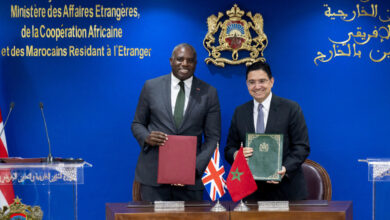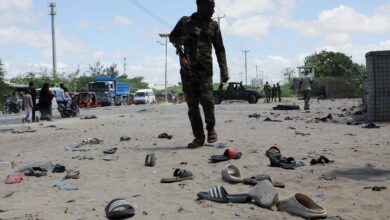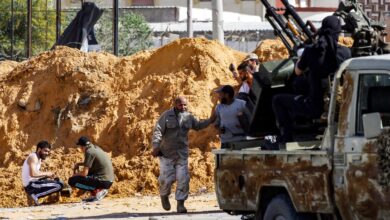Pope Denounces Economic Colonialism on DR Congo

Pope Francis arrived in the Democratic Republic of Congo on Tuesday, denouncing “economic colonialism” that he said had plundered the resources of the mineral-rich and conflict-torn nation.
Massive crowds thronged Kinshasa for a glimpse of the popemobile, cheering and waving flags as the 86-year-old pontiff made his way from the airport to the presidential palace.
On his fifth trip to Africa, Pope Francis, 86, is bringing a message of peace to the Democratic Republic of Congo and neighbouring South Sudan, both wracked by decades of stubborn conflict.
In a speech at the presidential palace, the pope received applause as he touched on the country’s “history of foreign domination.”
He said that “political exploitation gave way to an economic colonialism that was equally enslaving” in the DRC.
“As a result, this country, massively plundered, has not benefited adequately from its immense resources,” he told an audience of Congolese politicians and other dignitaries, speaking in Italian.
“Hands off the Democratic Republic of the Congo, hands off Africa,” he said. “It is not a mine to be stripped or a terrain to be plundered”.
The message will resonate well in the DRC, a country of about 100 million people, which won independence from Belgium in 1960.
Despite its vast mineral reserves of minerals, the DRC remains one of the poorest countries in the world.
About two-thirds of the population lives on less than $2.15 a day, according to the World Bank.
It is the first time since 1985 that a pope has visited the DRC, where about 40 percent of whom are Catholic.
The six-day trip to DRC and South Sudan had been planned for July 2022, but postponed due to the pontiff’s knee pain that has forced him in recent months to use a wheelchair.
He boarded and disembarked the plane via an elevator.
Security concerns were also said to play a role in delaying the trip, and a stop in the DRC’s east, where dozens of armed groups operate, is no longer on the itinerary.
M23 rebels — allegedly backed by the DRC’s smaller neighbour Rwanda — have captured swathes of territory in eastern Congo since late 2021, coming within miles (kilometres) of Goma, a commercial hub of over one million people.
“I would have liked to go to Goma too, but with the war, you can’t go there,” the pope told reporters on the plane.
At the presidential palace, Francis also urged that more attention be paid to the conflict.
“We cannot grow accustomed to the bloodshed that has marked this country for decades, causing millions of deaths that remain mostly unknown elsewhere,” he said.
The pope added that he supported ongoing regional peace efforts.
Eastern Congo has also seen a wave of deadly attacks blamed on the Allied Democratic Forces (ADF), a group the Islamic State claims as an affiliate, including a bomb blast at a Pentecostal church this month that killed 14 people.
President Felix Tshisekedi also gave a speech condemning the conflict, which he accused Rwandan of fomenting.
“Foreign powers greedy for the minerals contained in our subsoil commit cruel atrocities with the direct and cowardly support of our neighbour, Rwanda, thus making security the government’s first and greatest challenge,” the 59-year-old said.
The DRC is scheduled to hold a presidential election on December 20, in Tshisekedi has declared he will stand for a second term in office. The president originally came to power after a strongly disputed election in 2018.
Francis, in his speech, underlined the importance of “free, transparent and credible elections.”
“May no-one be manipulated, much less bought, by those who would foment violence in the country, and exploit it in order to make shameful business deals,” he said.
Tens of thousands of people are expected to attend a prayer vigil on Tuesday evening at Kinshasa’s N’dolo airport ahead of a mass on Wednesday morning, which is tipped to draw more than a million faithful.
On Friday, Francis will travel to Juba, the capital of South Sudan, also one of the world’s poorest countries, that has lurched from one crisis to another since gaining independence in 2011.
It suffered a brutal five-year civil war, while continued conflict between rival ethnic groups exacts a terrible toll on civilians.
The pope will be joined in Juba by the Archbishop of Canterbury, Rowan Williams, and the leader of the Church of Scotland, on what he has called “an ecumenical pilgrimage of peace”.





